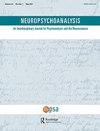分离痛苦假说:抑郁症的终极理论?
Q3 Psychology
引用次数: 0
摘要
在他关于分离痛苦假说的最新论文中,瓦特提出了一个令人信服的案例,即抑郁症最终源于对社会问题的适应性反应。尽管我们同意瓦特的许多说法,但我们认为,分离痛苦假说只告诉了我们故事的一部分。没有什么理由支持他的模型胜过其他以社会为导向的抑郁症理论,我们主张在理论精神病学中采用一种综合方法,这种方法可以有效地结合来自每种进化观点的见解,包括瓦特自己的观点。关键词:分离苦恼假说;进化;抑郁症;公开声明作者未报告潜在的利益冲突。本研究由惠康人类神经成像中心资助:[批准号205103/Z/16/Z];和加拿大-英国人工智能计划[批准号ES/T01279X/1]。本文章由计算机程序翻译,如有差异,请以英文原文为准。
The separation distress hypothesis: The ultimate theory of depression?
ABSTRACTIn his latest treatise on the separation distress hypothesis, Watt makes a compelling case that depression ultimately stems from an adaptive response to problems in the social world. Despite our agreement with many of Watt's claims, we argue here that the separation distress hypothesis only tells us part of the story. Finding little reason to favour his model over other socially-oriented theories of depression, we advocate instead for an integrative approach in theoretical psychiatry that can fruitfully incorporate insights arising from each of these evolutionary views, including Watt's own.KEYWORDS: Separation distress hypothesis; evolution; depression; active inference Disclosure statementNo potential conflict of interest was reported by the author(s).Additional informationFundingThis work was supported by Wellcome Centre for Human Neuroimaging: [Grant Number 205103/Z/16/Z]; and a Canada-UK Artificial Intelligence Initiative [Grant Number ES/T01279X/1].
求助全文
通过发布文献求助,成功后即可免费获取论文全文。
去求助
来源期刊

Neuropsychoanalysis
Psychology-Neuropsychology and Physiological Psychology
CiteScore
2.50
自引率
0.00%
发文量
24
 求助内容:
求助内容: 应助结果提醒方式:
应助结果提醒方式:


